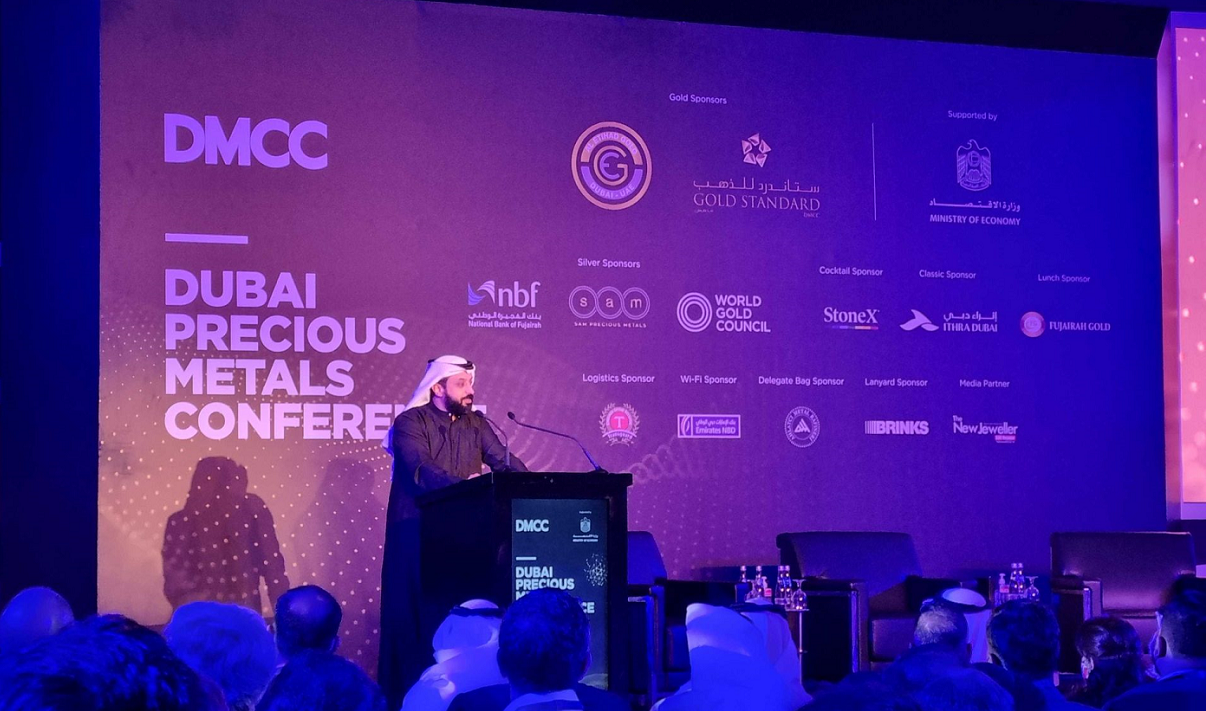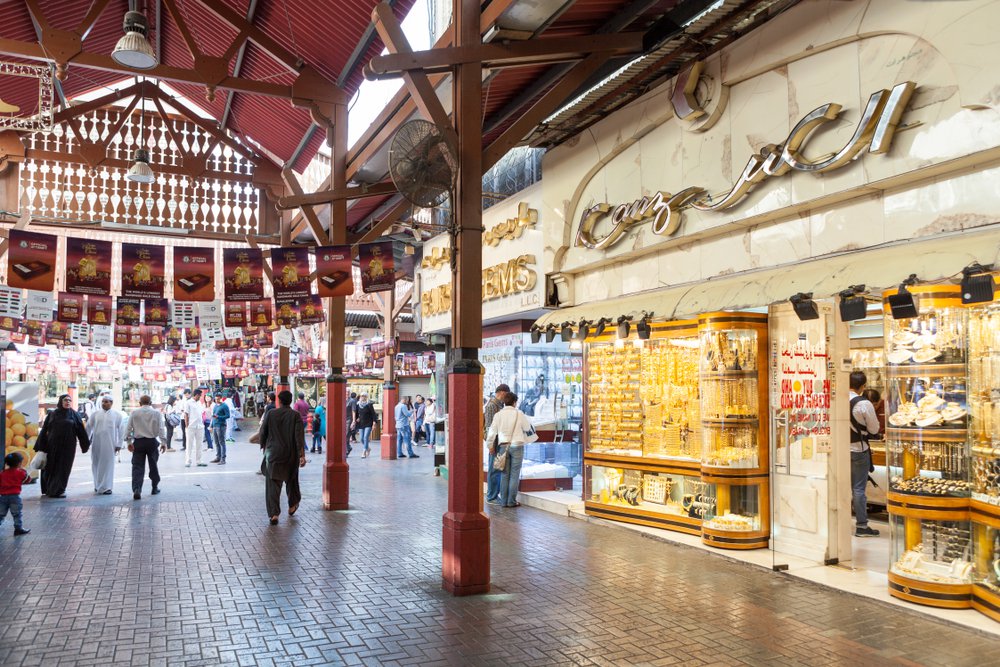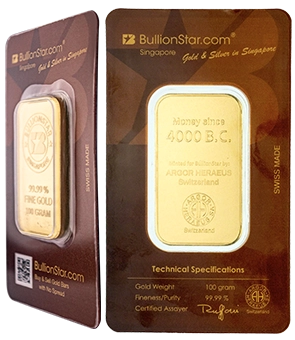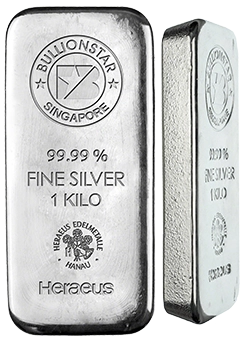UAE Takes On LBMA With Launch of Gold Good Delivery Standard
In the ongoing tug of war between the gold trading centres of, on the one hand, the United Arab Emirates (UAE), and on the other, the axis of London-Switzerland, the UAE has now thrown down the gauntlet with the launch of a UAE Good Delivery Standard for gold, a system which will go into effect beginning in February.
This UAE Good Delivery Standard will be pretty much like the LBMA Good Delivery Standard for gold, and will govern which gold bars from which refiners will be acceptable for settlement and trading in the UAE market.
Readers of BullionStar blogs will be familiar with the fact that UAE-Dubai and London-Switzerland have not been on the best of terms for quite some time, and that the Dubai / UAE gold industry, in the form of such personalities as Ahmed Sultan Bin Sulayem, executive chairman of the Dubai Multi Commodities Centre (DMCC), have not been afraid to push back against LBMA – Swiss interference.
Recall the BullionStar articles “In Delusional Push, LBMA Threatens to Blacklist Entire Gold Trading Centres” (24 November 2020), “In Ongoing Saga, Dubai Stands its Ground with the LBMA" (18 June 2021), and “Swiss pressure against UAE gold imports causes sharp rebuttal” from Dubai (27 October 2021).
This latest launch of a UAE Good Delivery (UAEGD) Standard for gold must therefore be seen in the context of developments which have been ongoing for quite some time, a context which while frequently cloaked in front men such as NGOs and the OCED, and a complicit MSM spin about illicit gold mining / gold smuggling, is, at the end of the day all about UAE commercial and sovereign independence vs LBMA bullion bank cartel control.
Note that the United Arab Emirates (UAE) consists of 7 Emirates, namely Abu Dhabi, Dubai, Sharjah, Ajman, Ras Al Khaimah, Fujairah and Umm Al Quwain. Abu Dhabi is the administrative capital, Dubai is the most populous emirate. The total population of the UAE is 10 million.
The Dubai Precious Metals Conference (DPMC)
While discussion of a UAE Good Delivery standard for gold (which is much like the LBMA Good Delivery standard for acceptable gold bars) first emerged at a meeting of the UAE’s Ministerial Development Council in Abu Dhabi on 6 December 2020, the actual launch of the UAEGD was announced on 18 November at the 2021 Dubai Precious Metals Conference (DPMC), after details were finalized at a meeting of the UAE Bullion Market in Abu Dhabi Committee on 9 October.

Notably, the opening address of the Dubai Precious Metals Conference on 18 November was given by DMCC’s Ahmed Sultan Bin Sulayem, and in characteristic style, Bin Sulayem didn’t hold back from addressing the real issues at stake, when he rebuked the attacks from Switzerland less than a month earlier:
“I want to first address the elephant in the room, namely, the consistent and unsubstantiated attacks launched on Dubai by other trading centres and institutions. As a strategic location which connects producing countries with major manufacturing centres, and the largest consuming markets in the world, Dubai has a unique comparative advantage.
Unfortunately, rather than finding ways to collaborate or engage, Dubai has faced a continuous barrage of unsubstantiated criticism from a broad range of stakeholders including corrupt NGOs, de facto regulators, and more recently the Swiss Secretariat for Economic Affairs which has directed to its refineries trying to get strict on UAE gold."
Bin Sulayem continued:
“For the benefit of such institutions, I’ll start reminding them that DMCC’s practical guidance which has been in effect since 2012, enforces all members to follow the OECD due diligence guidance, which is mandatary for all Dubai Good Delivery and Market Deliverable Brands and accredited refiners.
Just as the LBMA’s Responsible Gold Guidance enforces the same mandatory policies for it’s LBMA accredited refiners.
“Either you accept that the OECD is a standard worth following, in which case you should accept all gold from accredited refiners, or none at all.
In the same way that Meta and Twitter how shown widely corrupt they can be with data privacy, so have these institutions shown that they are not interested in working to improve the industry standards, but protect their own financial interests at the cost of everyone else.”
For the above speech, see minutes 09:45 – 13:00 at the following video link.
Strong words for the assembled cast of bullion market attendees at the Dubai conference, a few of whom (from the LBMA and Switzerland) probably choked on their coffee as they listened.
Next up at the18 November conference was Thani Al Zeyoudi, UAE Minister of State for Foreign Trade who publicly announced the launch of the UAE Good Delivery (UAEGD) Standard at the conference attendees, saying that it would align UAE wide gold sector practices with the OECD due diligence guidance.
UAE Good Delivery Standard launch
Ten days later on 28 November in Abu Dhabi, the UAE Bullion Market Committee conducted the ‘official’ launch of the UAE Good Delivery standard, which they also call the “Emirates Standard for Good Delivery” for refiners and smelters. This launch was officiated by Thani Al Zeyoudi (which is also chairman of the UAE Bullion Market Committee), and UAE Minister of Economy, Abdullah bin Touq Al Marri.

Based on coverage of this launch (from a statement by the UAE Ministry of Economy), what do we know about this new standard for gold?
In summary:
• The Emirates Standard for Good Delivery (UAEGD) is a voluntary standard that provides a national framework for the gold sector, in line with international best practices
• It’s a new national standard, across all of the United Arab Emirates, and not just Dubai.
• The UAEGD covers ‘quality and technical specifications of refineries and gold production facilities’ in the UAE
• This includes 3 evaluation criteria (technical capabilities, financial soundness, and gold sourcing procedures of the participant refinries / facilities)
• The UAEGD is one spoke in the UAE federal policy framework for the gold sector
• Under the hood, the plan is to essentially adopt the “Dubai Standard for Good Delivery” and roll it out as the applicable standard at the national (UAE) level.
According to Al Zeyoudi (UAE Minister of State for Foreign Trade), the UAE Good Delivery standard will:
• Strengthen UAE’s position as a global gold, jewelry and bullion trade hub
• Enhance the competitiveness of the products from UAE gold refineries and gold sector participants
• Facilitate the access of UAE refineries and other UAE gold sector participants to global markets
• By adopting best international practices, strengthen governance and regulation of the UAE gold sector

Another Minister of State at the launch, Ahmed bin Ali Al Sayegh, who notably referred to gold as a “strategic commodity”, said that the UAE Good Delivery system aims to apply to all aspects of gold trading in the UAE, including gold exports and gold imports, and manufacturing and logistics.
Interestingly, the Ministry of Economy statement about the UAEGD launch revealed some recent trade statistics about the UAE gold and precious metals sector:
• Gold, diamonds, and jewelry trade comprise 25% of UAE’s total non-oil foreign trade
• In 2020, UAE international trade volume of gold, diamonds, and jewelry totaled approximately $100 billion.
• UAE’s gold exports in 2020 were approx $30 billion (56% higher than 2019)
• First half 2021 UAE gold exports totaled $18 billion (40% higher than the H1 2020, and nearly double H1 2019)
• The number of licensed smelters in the UAE = 28
• The number of UAE facilities operating in the metals & gemstones sector and related commercial activities = 5,604
Since the UAE Bullion Market Committee is a steering committee, it has now formed a day to day ‘Executive Office’ team to manage the UAE Good Delivery standard and to implement the Committee’s initiatives. The head of this team is Muhammad Ali Al Kamali.
Conclusion
Details of the UAE Good Delivery system do not seem to have been published yet. If you look at the DMCC website under a page which was previously called Dubai Good Delivery, this page has now been retitled UAE Good Delivery.
This pages states that given the launch of Emirates Good Delivery on 18 November 2021, the existing Dubai Good Delivery (DGD) guidelines will now be ‘UAE Good Delivery (UAEGD)’ guidelines, and that UAEGD will be governed the ‘UAE Good Delivery Accreditation Rules’ of the ‘Emirates Bullion Market Committee’.
However, as of time of writing, the existing DGD guidelines documents and accreditation rules have yet to be replaced by UAEGD documents and UAEGD accreditation rules. The page says “More information to follow in due course”. So watch this space.
Until more information becomes available, anyone wanting to read about the LBMA Good Delivery Standard for gold, and how accredited refineries are accepted and monitored, can do so here.
Since the launch of the UAE Good Delivery Standard on 28 November, the attacks against the Dubai and UAE gold sector have continued, most notably exactly one month later on 28 December 2021 when Bloomberg (no surprises) published a veritable hit piece on the Dubai gold sector titled “Dubai Can’t Shake Off the Stain of Smuggled African Gold”.
This hit-piece was highly planned and detailed and used the input of no less than 11 Bloomberg reporters as well as the input of NGOs, various African politicians, and un-named sources in Dubai, and painted UAE officials as being on the defensive.
Which begs the question, why does Bloomberg never use one reporter (let alone 11) to investigate and publish an article titled “London Can’t Shake Off the Stain of Smuggled Gold / illegally Mined Gold / illicitly sourced Gold”? Because there is plenty of anecdotal evidence that such gold sourcing exists connected to LBMA banks and refiners.
Popular Blog Posts by Ronan Manly
 How Many Silver Bars Are in the LBMA's London Vaults?
How Many Silver Bars Are in the LBMA's London Vaults?
 ECB Gold Stored in 5 Locations, Won't Disclose Gold Bar List
ECB Gold Stored in 5 Locations, Won't Disclose Gold Bar List
 German Government Escalates War On Gold
German Government Escalates War On Gold
 Polish Central Bank Airlifts 8,000 Gold Bars From London
Polish Central Bank Airlifts 8,000 Gold Bars From London
 Quantum Leap as ABN AMRO Questions Gold Price Discovery
Quantum Leap as ABN AMRO Questions Gold Price Discovery
 How Militaries Use Gold Coins as Emergency Money
How Militaries Use Gold Coins as Emergency Money
 JP Morgan's Nowak Charged With Rigging Precious Metals
JP Morgan's Nowak Charged With Rigging Precious Metals
 Hungary Announces 10-Fold Jump in Gold Reserves
Hungary Announces 10-Fold Jump in Gold Reserves
 Planned in Advance by Central Banks: a 2020 System Reset
Planned in Advance by Central Banks: a 2020 System Reset
 China’s Golden Gateway: How the SGE’s Hong Kong Vault will shake up global gold markets
China’s Golden Gateway: How the SGE’s Hong Kong Vault will shake up global gold markets




 Ronan Manly
Ronan Manly 0 Comments
0 Comments










